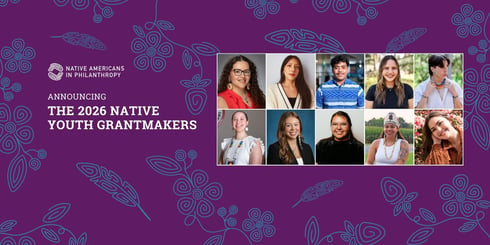NAP Announces New Partnerships At White House Economic Roundtable
NAP Announces New Partnerships At White House Economic Roundtable
The Biden-Harris Administration commits to new public-private partnerships to increase capital access in Tribal communities.
On February 29, 2024, the White House convened a Roundtable on Increasing Tribal Access to Capital aimed at tackling the structural barriers that have historically made it difficult for Native communities to fund critical projects like roads, schools, and hospitals. It also focused on the role the federal government can play in increasing capital access to Native entrepreneurs and small business owners. The meeting resulted in the establishment of two new public-private partnerships as well as a historic challenge from Secretary Haaland to the philanthropic and financial sectors to increase their commitments in Indian Country.
Several senior administration officials attended the Roundtable, including Interior Secretary Deb Haaland (Laguna Pueblo tribe), Small Business Administrator Isabel Guzman, Commerce Deputy Secretary Don Graves, U.S. Treasurer Lynn Malerba (Lifetime Chief of the Mohegan Tribe), Acting Comptroller of the Currency Michael Hsu, and USDA Deputy Under-Secretary for Rural Development Farah Ahmad. In addition, nearly two dozen philanthropic and financial institutions were represented in the discussions, including the Skoll Foundation, the Doris Duke Foundation, Bezos Earth Fund, Goldman Sachs, the Robert Wood Johnson Foundation, and Wells Fargo.
Much of the discussion focused on ways that the administration, philanthropy, and financial institutions could better support Native community development financial institutions, or CDFIs, which are often the only entities serving Tribal communities. Secretary Haaland reiterated the administration’s commitment to removing bureaucratic barriers that historically prevented federal funds from flowing to Tribes efficiently—or at all.
Equally important, she challenged the philanthropic sector, which in recent decades has committed less than one half of one percent of its giving to Tribes and Tribal communities, to commit 10 percent. She also urged banks and financial institutions to partner with the federal government to help unlock unprecedented levels of public investments in tribal communities, including $32 billion in the American Rescue Plan, $13 billion in the Bipartisan Infrastructure Law, and $700 million in the Inflation Reduction Act.
Native Americans in Philanthropy was proud to be a hosting partner for the event alongside Hyphen and Mission Driven Finance, two organizations dedicated, like NAP, to leveraging public and private dollars to increase investments in marginalized communities. We also used the occasion to join with Hyphen and MDF in announcing two public-private partnerships that could unlock billions of dollars for Indian Country:
- The Tribal Community Vision Fund is a national multi-year initiative launched by NAP to expand capital access to promote self-determination and sustainable economic development in Tribal communities. Over the next 5-7 years, we are seeking to raise and deploy $1.2 billion—$200 million in grants and $1 billion in capital—in private and philanthropic commitments to leverage historic levels of federal funding and unlock potentially billions of dollars of investments in Tribes and Native-owned businesses. These investments will provide the capacity, collateral, and capital Tribes need to improve their economic outlook and outcomes.
The Vision Fund will help Tribal governments work around issues that have historically hampered economic development, such as Tribe’s inability to levy property and other taxes and Tribal member’s inability to secure loans with collateral based on property ownership. The Fund plans to invest half of its funds in community development projects and half in economic development, including large-scale renewable energy, climate mitigation, and environmental sustainability projects.
- The Indigenous Futures Fund is raising $2 million in grants and $25 million in investment capital to help ensure that the recent unprecedented levels of federal investment in Tribal Nations, including $500 million through the State Small Business Credit Initiative, reach and serve the communities they are meant to help—specifically, Native entrepreneurs and small businesses. To date, there are already 63 tribes with approved SSBCI programs totaling $159 million, and not a single CDFI administering one of these programs has defaulted. This demonstrates that Indigenous entrepreneurs are a good investment and helps build trust with partners.
The Indigenous Futures Fund is a joint project of Hyphen and MDF that will work closely with the Vision Fund. It is designed to help Tribes overcome specific challenges to accessing funds through SSBCI, such as requirements for private matching funds, administrative and capacity limitations (especially around reporting requirements), and the need for more technical assistance than formally offered through SSBCI.
This Roundtable followed on three executive orders that President Biden signed to enhance Tribal consultation, support Tribal sovereignty, and improve Tribal self-governance. Most recently, in December 2023, the president signed an Executive Order on Reforming Federal Funding and Support for Tribal Nations to Better Embrace Our Trust Responsibilities and Promote the Next Era of Tribal Self Determination, which requires federal agencies to act to ensure federal funding for Tribes is accessible, flexible, and equitable. The federal government has also launched a Tribal Access to Capital Clearinghouse to help Tribes and Native-owned businesses identify federal funding opportunities. On the private funding side, recent regulatory changes allow banks to now serve tribal communities and receive Community Reinvestment Act credit regardless of their geographic location.
To learn more about public and private funding opportunities, please reach out to ddesiderio@nativephilanthropy.org.



Comments